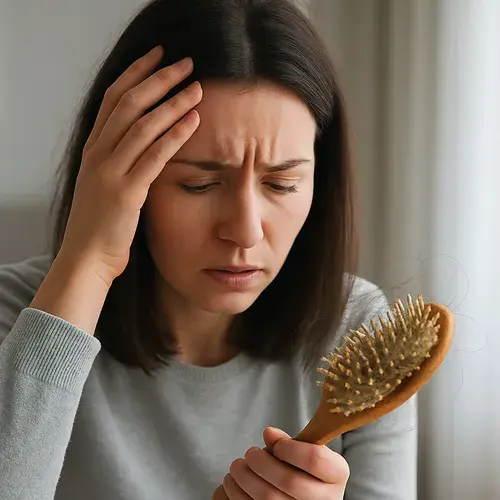Stress and Hair Loss: The Connection. How stress triggers hair loss and ways to manage it
Chronic stress disrupts hair growth by affecting follicle stem cells, leading to hair loss. Learn how stress triggers this and discover effective tips to

Stress is a ubiquitous part of modern life, affecting nearly every aspect of our well-being. One often overlooked consequence of chronic stress is its impact on our hair. Hair loss due to stress is a common phenomenon, and understanding the mechanisms behind it can help us find effective ways to manage this issue. In this article, we will delve into the connection between stress and hair loss, exploring how stress triggers hair loss and providing practical tips on how to manage it. The Biological Mechanism of Stress-Induced Hair Loss Stress triggers hair loss primarily through the release of stress hormones, such as corticosterone in rodents and cortisol in humans. These hormones play a crucial role in regulating various bodily functions, including the hair growth cycle. When we experience stress, our adrenal glands produce more of these hormones, which can disrupt the normal functioning of hair follicle stem cells. Research conducted by scientists at Harvard University has shed light on the specific biological pathway involved in stress-induced hair loss. They found that chronic stress puts hair follicle stem cells into an extended resting phase, preventing them from regenerating hair follicles and leading to hair loss. This process is mediated by a cluster of cells underneath the hair follicle called the dermal papilla, which is affected by corticosterone. The hormone prevents these cells from secreting GAS6, a molecule essential for activating hair follicle stem cells. By delivering GAS6 into the skin, researchers were able to restore hair growth in mice subjected to chronic stress. Types of Hair Loss Associated with Stress Stress can lead to several types of hair loss, each with distinct characteristics: Telogen Effluvium: This is one of the most common forms of hair loss associated with stress. It occurs when an excessive number of hair follicles enter the resting phase (telogen) prematurely, leading to a sudden increase in hair shedding. This condition is usually reversible and hair typically grows back within three to six months. Androgenetic Alopecia: Also known as male/female pattern baldness, this condition is influenced by hormonal imbalances and can be exacerbated by chronic stress. While it is primarily driven by genetic and hormonal factors, managing stress can help slow down its progression. Alopecia Areata: This autoimmune condition causes patchy hair loss due to an immune system attack on hair follicles. While not directly caused by stress, managing stress levels can help alleviate symptoms and improve overall health. Managing Stress to Prevent Hair Loss While it's impossible to eliminate all stress from our lives, there are several strategies that can help mitigate its impact on our hair: Stress Management Techniques: Engage in stress-reducing activities such as meditation, yoga, or deep breathing exercises. These practices can help lower cortisol levels and promote a healthier environment for hair growth. Balanced Diet: A well-balanced diet rich in vitamins and minerals is crucial for maintaining healthy hair. Ensure you get enough zinc, iron, and biotin, which are essential for hair growth. Regular Exercise: Regular physical activity can help reduce stress levels and improve overall health. However, excessive exercise can also lead to increased cortisol production, so moderation is key. Sleep Hygiene: Adequate sleep is vital for maintaining hormonal balance and promoting hair growth. Aim for 7-8 hours of sleep each night to help regulate your body's response to stress. Professional Help: If you notice sudden or patchy hair loss, it's important to consult a healthcare professional. They can rule out any underlying medical conditions that may be contributing to your hair loss and provide personalized advice on managing it. Conclusion Stress and hair loss are intricately linked through the release of stress hormones like corticosterone and cortisol. Understanding this connection allows us to take proactive steps in managing our stress levels, thereby reducing the risk of hair loss. By incorporating stress management techniques, maintaining a balanced diet, engaging in regular exercise, and ensuring adequate sleep, we can create a healthier environment for our hair to thrive. If you're experiencing hair loss due to stress, don't hesitate to seek professional advice for personalized guidance on managing this condition effectively.
Need Professional Consultation?
Our professional doctors will provide detailed hair and scalp analysis and develop personalized treatment plans.
Book Consultation Now